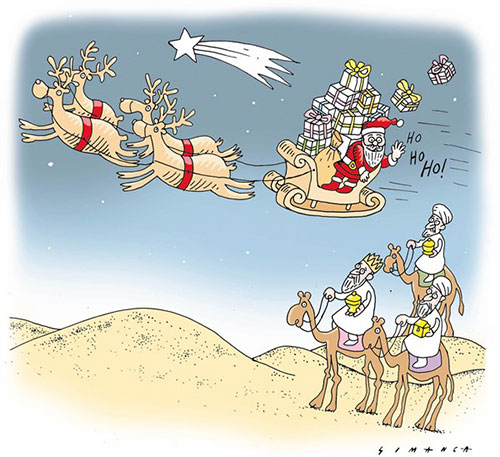
Merriment, Generosity Define ChristmasBy TOM PURCELLDecember 22, 2015
"Ah, yes, you speak of the Christmas holiday. According to History.com, it is 'both a sacred religious holiday and a worldwide cultural and commercial phenomenon.'" "I thought it was the day we celebrate the nativity of Jesus Christ?" "It is an important feast or holy day for Christians, who believe, as written in the Bible, that 'God so loved the world that he gave his only Son, so that everyone who believes in Him might not perish but may have eternal life.'" "That's what I believe and the reason I go to Christ's mass — the origin of 'Christmas' — at my Catholic church every year."
Christmas
"Pagan traditions?" "Look, long before Jesus was born, December was party time. Pagan sun worshippers celebrated winter solstice, the beginning of the end of long, dark days. They slaughtered cattle, ate excessively and consumed many adult beverages. " "Sounds like Christmas dinner at my house." "Well, the Bible doesn't say what date Jesus was born. Some scholars believe that He was born in the spring — but that, in the 4th century, Catholic popes moved his birthday to December 25 to coincide with winter solstice celebrations. Some religious scholars debate the theory, however." "Interesting stuff." "The Christmas tree originates from pagan traditions, however. It was born in the 8th century, when, according to Infoplease.com, 'St. Boniface cut down an enormous oak tree that was central to the worship of a particular tribe, but a fir tree grew in its place. The evergreen was offered as a symbol of Christianity, which the newly converted Germans began decorating for Christmas.'" "How about the origin of mistletoe?" "Infoplease.com says that the Druids believed that mistletoe 'represented the joining of heaven and Earth, and God's reconciliation with mankind. A kiss under mistletoe symbolized acceptance and reconciliation.'" "No wonder I can never get the wife beneath it." "Here's an interesting fact about modern Christmas traditions: They are relatively new. In fact, did you know that in 1645 in England, Oliver Cromwell banned Christmas?" "What?" "According to LiveScience.com, reformist-minded Protestants of the 16th century believed Christmas was too paganistic — too 'raucous, rowdy and sometimes bawdy.' The American Puritans believed likewise. It was illegal to celebrate Christmas in New England for about 25 years." "Then how did modern Christmas become such a big deal?" "Like many American traditions, Americans reinvented it. History.com says that in 1819. Washington Irving penned a series of stories about Christmas celebrations — stories that introduced the concept of peace, ancient Christmas customs and the bringing together of people from all backgrounds. In England, Charles Dickens also advanced modern Christmas traditions." "The guy who wrote about Ebenezer Scrooge?" "Yes, History.com says that Dickens' famous holiday tale, 'A Christmas Carol,' promoted 'charity and good will towards all humankind' and persuaded many Victorians to embrace Christmas celebrations. His story is one reason many are so charitable during the Christmas season." "This year the wife and I and the extended family are forgoing gift-giving. We're going to give that money to the needy instead!" "An excellent idea. Look, whether Christmas is a day for believers to celebrate their religious faith or a day for non-believers to enjoy non-religious traditions, we should all agree on one point." "Which is?" "Christmas is a day of merriment, graciousness and generosity." "There's only one response to that sentiment. Merry Christmas!"
©2015 Tom Purcell. Tom Purcell, author of "Misadventures of a 1970's Childhood" and "Comical Sense: A Lone Humorist Takes on a World Gone Nutty!" is a Pittsburgh Tribune-Review humor columnist and is nationally syndicated exclusively by Cagle Cartoons Inc. E-mail Tom at Tom@TomPurcell.com Publish A Letter in SitNews Read Letters/Opinions
|
||
